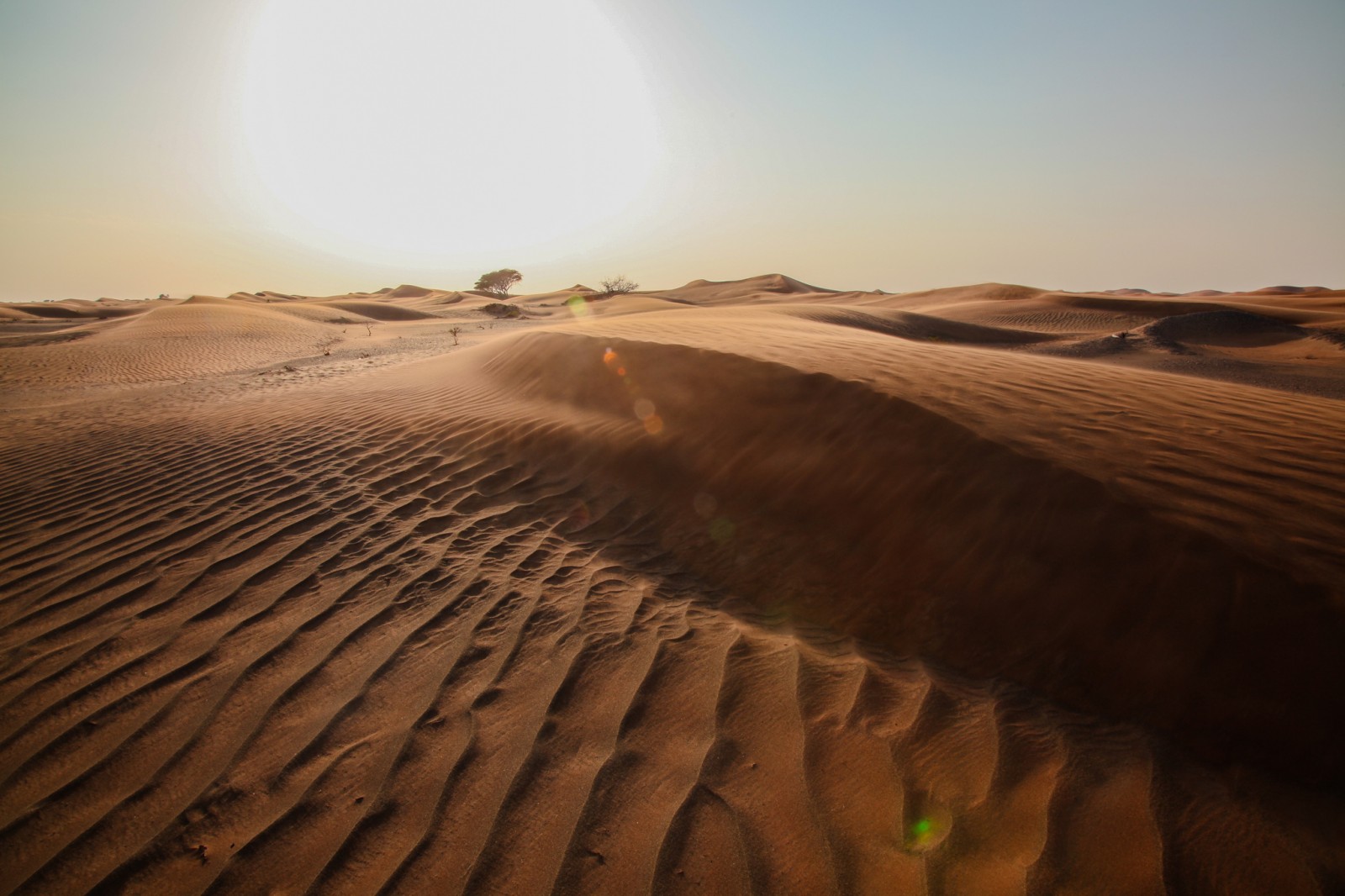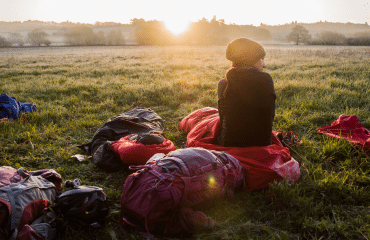“I knew instinctively that it was the very hardness of life in the desert which drew me back there – it was the same pull which takes men back to the polar ice, to high mountains, and to the sea.” – Wilfred Thesiger
Learn more about our expedition into the Empty Quarter desert:
- Background to the expedition
- Profile of Wilfred Thesiger
- Profile of Alastair Humphreys and Leon McCarron
- Expedition Kit List
- Self-filming an expedition
- Photographs from the expedition
“I knew instinctively that it was the very hardness of life in the desert which drew me back there – it was the same pull which takes men back to the polar ice, to high mountains, and to the sea.â€
— WILFRED THESIGER, 1959
My head is thumping. My eyes are stinging. I’mm weak with thirst. The dunes behind glow a deep shade of ochre. In front is nothing. Nothing at all. A gravel plain stretches to the horizon and for hundreds of miles beyond. I feel overwhelmed by the scale of the desert and by the hundreds of silent, scorching miles that still lie ahead. I haven’t showered or slept in a bed for weeks. I’mm hungry, thirsty, and weary from hauling heavy but tightly rationed supplies in a homemade cart. Yet there is nowhere on Earth that I would rather be. This is the Empty Quarter, the world’s largest sand desert, on the Arabian Peninsula. I have waited 15 years to get here.
In England, inspiration and history lurk around every corner, making it a fine place for a young man to be when he first begins to dream of adventure. I was at Oxford University when I first read about explorer and travel writer Wilfred Thesiger. He studied there and daydreamed there, like me. Thesiger became one of my heroes. Inspired by him, I even joined the university Boxing Club—a foolish and short-lived venture.
After Oxford, Thesiger fought in World War II with the SAS, the British Special Forces whose motto is “Who Dares Wins.†Thesiger hated modernization, automobiles, and easy living. Following the war, he traveled the world, notably spending years with the Bedu in Arabia and the Marsh Arabs in Iraq, earning the moniker, “Mubarak bin London,†Arabic for “the blessed one from London.â€
Major Sir Wilfred Patrick Thesiger, CBE, DSO, FRAS, FRGS—to give his full title—was the stereotypical old-fashioned British explorer: tall, craggy-featured, and equally at ease wearing Arab robes or a sharp London three-piece suit. He was eccentric, hard-as-nails, and lived a life filled with extraordinary adventure.
Thesiger had “the man’s courage to live out the boy’s dream.†His greatest book, Arabian Sands, is considered a classic of British travel writing. It encouraged me to think ambitiously, but simply, about big journeys of my own. His prose is sparse and measured, thoughtful and honest. He was committed to always testing himself. He lived ascetically and strived to match the Bedu’s high standards: The harder the life, Thesiger believed, the finer the person. And ever since I read Arabian Sands I dreamed of one day making a journey in his footsteps, into the Empty Quarter desert.
Thesiger and his Bedu companions made a series of epic journeys into the unexplored interior of the Empty Quarter in the 1940s. My journey was inspired by him but didn’t pretend to replicate any of his routes. There were pragmatic reasons for this. It is no longer permitted to wander at will around Saudi Arabia. I had no idea how to drive a camel, and couldn’t afford one anyway. So my plan was to string together segments from Thesiger’s different journeys, hauling my supplies in a homemade cart filled for a journey of 1,000 miles from southern Oman to the glitzy madness of Dubai.
I recruited Leon McCarron, a fellow adventurer and admirer of Thesiger, to accompany me. I barely knew him, but it’s not always easy to find volunteers to haul a nearly 700lb. cart 1,000 miles across a desert. Besides, we would have plenty of time out there in the sands to get to know one another…
Our trip was last-minute and very low-budget. A farmer I knew built a cart to the design Leon and I gave him. We only had time for one day of training. And that day—shivering in the rain on the beach in an out-of-season English seaside town—really did not feel like ideal preparation for what awaited us in the desert.
Out in Salalah, on Oman’s southern coast, we loaded up the cart with nearly 30 gallons of water and a month’s supply of instant noodles, biscuits, and tins of mysterious-looking meat. We began hauling our cart down the road, bursting with heroic excitement. After 15 years of daydreaming, my Thesiger adventure was at last underway. And then it stopped.
Within moments of setting off, Leon and I discovered that our cart, fully loaded for the first time, did not steer. It was a disaster. We continued stubbornly for a few hours, manhandling the useless contraption down busy, noisy roads, and cursing our own incompetence. The whole journey was collapsing before our eyes. At dusk, without having even made it out of town, we gave up.
So often the highlights of adventures emerge from bad situations and revolve around the people you meet along the way. And so it was here. Over the next three days we met a wonderful cast of people in Salalah’s backstreet workshops. With great skill and imagination, they welded and whacked and bodged a steering system onto our cart. This cast of cheery strangers saved us from our own ineptness and rescued the expedition.
We began once again. To our enormous relief, this time the cart worked properly. It looked ridiculous, but we didn’t care. We hauled it out of town and along busy highways until, after a few days, we turned off the road and into the empty desert.
The days settled into steady routine. We would wake at 4am, pack quickly, and begin to walk. We were quiet at first, waking gradually as we walked. I loved the first hours of each day. The air was fresh and Venus was low and bright on the eastern horizon. With sunrise, color and conversation and laughter came flooding into the world. The colors of this adventure were limited but striking: the bright blue of a permanently cloudless sky, and the simple shades of orange and red desert.
Soon after sunrise the heat built and built until it dominated all of our thoughts. We would walk for an hour, then pause briefly for a sip of water and a bite to eat. Then we would walk again. We repeated this over and over until the heat became too overwhelming. And then we would rest for a few hours, hiding from the sun in the only shade we had—cramped together beneath our cart like two snoozing car mechanics. The tarpaulin we had brought to provide this crucial shade had performed admirably when I tested it in my garden. But the sun in the Empty Quarter desert turned out to be rather fiercer than England’s in October and our tarpaulin was useless. The nadir of our run of incompetence was the pitiful day our Thermarests fell off the cart. We eventually replaced them with two incredibly stylish floral mattresses that we found in a small store. Thesiger certainly would have disapproved.
The repetitive nature of the landscape offered little mental respite or diversion. Dragging the cart was hard work, and the age-old desert hardships that Thesiger encountered resonated as much today as ever:
“The ever-present hunger and thirst, the weariness of long marches: these provided the challenge of Bedu life against which I sought to match myself, and were the basis of the comradeship which united us.†— W.T.
Difficult though the journey was, I tried always to remind myself that, like Thesiger, “if I were in London I would give anything to be here.â€
The reward for our hardship was the simplicity of the life we were experiencing. Everything else was left behind. All we needed to do was walk. All we had to worry about was the journey. All we desired was food, water, and sleep. Jokes felt funnier. When we were fortunate enough to hear it, music sounded more powerful, more emotional. Escaping from the madness of modern life to the simplicity of the desert was extremely satisfying.
The landscapes were vast and changed only slowly. There were tall dunes that rose steeply and beautifully from the desert floor. But most of the time our surroundings were absolutely flat and empty. To stand on a gravel plain, spin 360 degrees, and see and hear nothing at all, made us feel very small indeed. Thesiger described this as “the silence we have driven from our world.â€
Much of the time we were on small gravel tracks or proper roads. We passed gas and oil installations and small settlements. The only thing that never changed was the slowness of our pace. I found it frustrating but cathartic to spend a whole day working hard to reach a spot that we had been able to see since we’d set out that morning. When we stopped at night, an hour or two after sunset, we would simply lay out our sleeping bags. No tents, no preparation, no hassle. We just stripped off sweaty shirts, cooked dinner, and then fell asleep.
And so the miles and hours and days and weeks passed. Leon and I had time a-plenty to get to know one another. In amongst the usual expedition conversations (food, women, more food), we discussed Thesiger’s journeys and wondered what he would make of our amateur efforts.
The local people who Thesiger held in such high regard no longer live such a harsh existence. On our journey they wound down the windows of their air-conditioned 4x4s to take photos of the crazy Brits on their camera phones. We caused hilarity wherever we went. The laughter was good-natured and the people were extraordinarily generous, showering us with gifts that ranged from the sensible (bottles of water) to the luxurious (an entire watermelon, ice creams—yes, ice creams in a desert!) to the bizarre (a bottle of aftershave).
One afternoon a huge red truck juddered to a halt in front of us. The driver, Ali, leaped from his cab to shake our hands. We sat together in the shade of his truck as he lit a fire and prepared coffee for us. I enjoyed this demonstration of timeless Bedu tradition and hospitality blended with the modern reality of a very different land to the idyllic one that Thesiger explored.
To his dismay, a westernized fate for the Middle East seemed inescapable. In the Foreword to Arabian Sands, Thesiger warns that in the years since his journeys there, the region had begun to show signs of the modernization he so abhorred.
“If anyone goes there now looking for the life I led they will not find it… Today the desert where I travelled is scarred with the tracks of lorries and littered with discarded junk imported from Europe and America.†— W.T.
At first it had saddened me that there were vehicles and oil platforms in the desert, that there were truck-stop cafes selling hot curry and cold Pepsi. But there is no point yearning for the past. Thesiger would have been astonished to see how much the region had changed in just a few generations. And nothing could have amazed him more than the place we had chosen for the finale of our expedition: The top of the tallest building in the world, the Burj Khalifa, in Dubai. It seemed like a perfectly ludicrous summary of how this part of the world has changed since Thesiger’s time. We felt so out-of-place in the shiny shopping malls of Dubai. We hadn’t washed in 1,000 miles. The modern city was an amusing place to finish our journey. I cannot imagine that many of my future expeditions will come to an end outside a Dolce & Gabbana store!
Leon and I are very different than Thesiger. He would doubtless have frowned at our journey, which was amateur, decadent, and wimpish by comparison. Thesiger and his companions frequently went for long periods with little food or water. They regularly exchanged rifle shots with bandits. Leon and I had over a gallon of water each day and the only shooting of locals was with our cameras. But enduring less extreme hardships didn’t damper my experience. As Thesiger wrote in Arabian Sands:
“No man can live this life and emerge unchanged. He will carry, however faint, the imprint of the desert, the brand which marks the nomad; and he will have within him the yearning to return, weak or insistent according to his nature. For this cruel land can cast a spell which no temperate clime can match.â€



Love the soundtrack to that. Cant wait to see the whole thing! Good work guys!
Inspirational stuff. Just ordered DVD and looking forward to it.
Great stuff guys, Makes want to head out on a adventure right now!